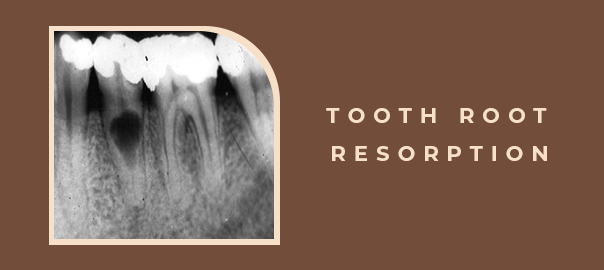
Tooth Root Resorption – Symptoms, Causes, Treatment
Tooth root resorption is characterized by the breakdown and loss of tooth root structure. It can occur for various reasons and lead to significant dental problems if left untreated. Here’s an overview of its symptoms, causes, and treatment options
Symptoms:
- 1. Tooth sensitivity, especially to hot or cold temperatures.
- 2. Toothache or discomfort, particularly when chewing or biting down.
- 3. Swelling and tenderness of the gums around the affected tooth.
- 4. Visible changes in tooth position or alignment.
- 5. Mobility or looseness of the affected tooth.
Causes:
- 1. Trauma: Injuries to the teeth, such as impact from accidents or sports-related injuries, can initiate the process of tooth root resorption.
- 2. Orthodontic treatment: Excessive pressure or force applied during orthodontic treatment can sometimes trigger root resorption.
- 3. Dental infections: Untreated dental infections or abscesses can lead to inflammation and subsequent tooth root resorption.
- 4. Genetics: Some individuals may be predisposed to develop tooth root resorption due to genetic factors.
- 5. Unknown factors: In some cases, the exact cause of tooth root resorption may not be identified.
Treatment:
- 1. Monitoring: In cases where the resorption is minimal and not causing significant symptoms or complications, regular monitoring by a dentist may be sufficient.
- 2. Root canal therapy: If the resorption has progressed to involve the pulp (the innermost part of the tooth), root canal treatment may be necessary to remove the damaged tissue and restore the tooth’s function.
- 3. Surgical intervention: In more advanced cases of root resorption, surgical procedures such as root resection or extraction may be required.
- 4. Orthodontic treatment modification: If orthodontic treatment is the suspected cause of root resorption, adjustments to the treatment plan may be necessary to minimize further damage.
- 5. Medications: In some cases, medications may be prescribed to manage symptoms such as pain or inflammation.
It’s essential to consult with a qualified dentist or endodontist if you experience any symptoms suggestive of tooth root resorption. Early diagnosis and intervention can help prevent further damage and preserve the affected tooth whenever possible.
DISCLAIMER:Please note that the prices mentioned on this page: (a) present a range (depending upon the severity of the dental condition, the technology used in treatment, type of dental products used, etc.); (b) are true as on the date of this page and may change on a later date, in accordance with the standard company policy; (c) may be subject to standard aberrations or generalizations on account of the use of AI in general Google/internet search by you.Leave a Reply
Leave a Reply
Explore More Similar Posts
Explore More Blogs


Leave a Reply